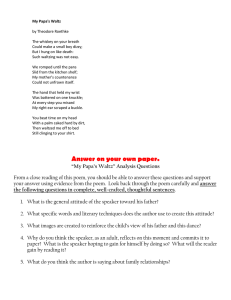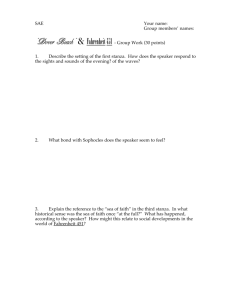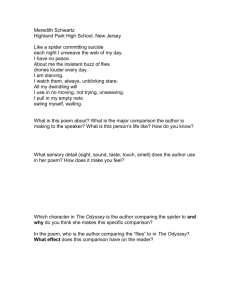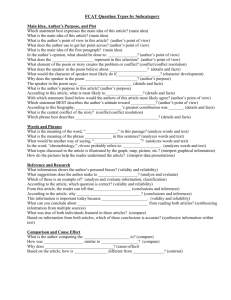Explication of "Something Like a Sonnet"
advertisement
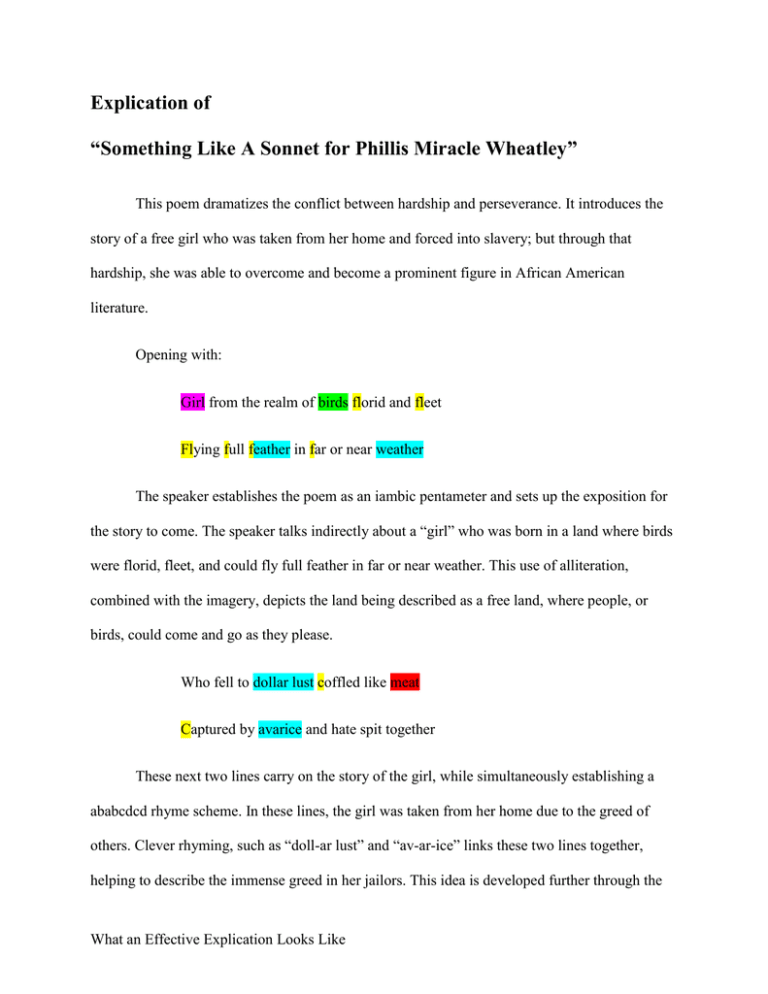
Explication of “Something Like A Sonnet for Phillis Miracle Wheatley” This poem dramatizes the conflict between hardship and perseverance. It introduces the story of a free girl who was taken from her home and forced into slavery; but through that hardship, she was able to overcome and become a prominent figure in African American literature. Opening with: Girl from the realm of birds florid and fleet Flying full feather in far or near weather The speaker establishes the poem as an iambic pentameter and sets up the exposition for the story to come. The speaker talks indirectly about a “girl” who was born in a land where birds were florid, fleet, and could fly full feather in far or near weather. This use of alliteration, combined with the imagery, depicts the land being described as a free land, where people, or birds, could come and go as they please. Who fell to dollar lust coffled like meat Captured by avarice and hate spit together These next two lines carry on the story of the girl, while simultaneously establishing a ababcdcd rhyme scheme. In these lines, the girl was taken from her home due to the greed of others. Clever rhyming, such as “doll-ar lust” and “av-ar-ice” links these two lines together, helping to describe the immense greed in her jailors. This idea is developed further through the What an Effective Explication Looks Like speaker’s syntax: she is coffled like meat, fallen to dollar lust. She is being sold as if she is a product, not a human being. Trembling asthmatic alone on the slave block built by a savagery travelling by carriage viewed like a species of flaw in the livestock A child without safety of mother or marriage After touching upon her capture, the speaker delves into the atrocities that this child underwent throughout her time as a slave. Alliteration in the early lines, “asth-matic” and “a-lone” add emphasis to the girl’s condition. She is just a frail child, being tortured by a “sav-agery” “trav-elling” by carriage. Due to the avarice of her captors, they only see her as a piece of meat, livestock; but in truth, she is an innocent child taken from her mother, without anyone to care for her. Chosen by whimsy but born to surprise They taught you to read but you learned how to write These are two major lines in the poem. They mark the transition from the speaker describing the background of the girl in 3rd person, to addressing her in 1st person, and speaking of her ability to triumph instead. The line structure also helps to acknowledge the girl as a unique individual, using a “What they did to her” but “what she did to overcome” format. She was put down, but she was able to surprise everyone with her ability to keep getting up. She took what was expected of her, and harnessed those skills and used it to her favor, not theirs. What an Effective Explication Looks Like Begging the universe into your eyes: They dressed you in light but you dreamed with the night These 3 lines are unique in that they break they break the structural consistency from the previous part of the poem. The iambic pentameter is lost with the abrupt break of a line, and the comparison format from the previous two lines is halted in the 1st line, and restarted again in the 2nd line. This error in consistency disallows the poem from being read as it was in the earlier lines – it marks a conclusion. The girl was able to overcome what her masters told her to do in the light, and she pondered during the night, thus allowing her to enrich her knowledge on the world around her and to promote her literature background. From Africa singing of justice and grace Your early verse sweetens the fame of our Race. The concluding lines of the poem, there is a lot of substance in this sentence. It is a direct message from the speaker of the story, to the girl in the poem, Phillis Miracle Wheatley. From the first line, it is clear that the speaker is proud to have such an inspirational icon originating from their former land; she has someone to look up to, even though her people were suppressed for so long. Moreover, Wheatley, being a poet and writer, was one of the first African-American poets in the Americas. With this being said, the “early verse” the speaker refers to is most likely the abundance of poems Wheatley created in her lifetime. From the following statement, “. . . sweetens the fame of our Race,” it can be inferred that the speaker is African-American as well, What an Effective Explication Looks Like and is immensely proud of her race, as it has incredibly powerful icons, such as Phillis Miracle Wheatley. What an Effective Explication Looks Like

